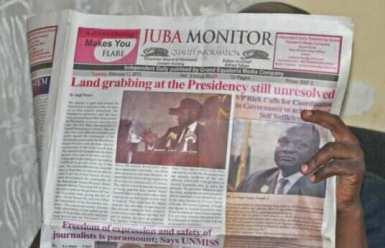S. Sudan security confiscates copies of newspaper over federalism debate
July 2, 2014 (JUBA) – South Sudanese security forces have confiscated copies of the Juba Monitor newspaper and threatened to arrest senior management and shut it down indefinitely should it continue to defy the government’s directives to stop covering the ongoing debate over federalism, its editor-in-chief Alfred Taban told Sudan Tribune on Wednesday

The veteran journalist described the actions of the government agents as “unconstitutional”, saying he feared it was the continuation of a crackdown on civil groups critical of the performance of the government.
He said the incident was an ominous sign for freedom of expression in the country.
“The security forces today (Wednesday) confiscated 15,000 copies of our paper because I have attacked them on the censuring of the public debates about federalism. Such [an] act indeed interferes with the freedom of expression,” Taban said in an exclusive interview.
Security officials were not immediately available for comment.
Nhial Bol Akeen, editor-in-chief of The Citizen newspaper, also confirmed that copies of the Juba Monitor had been confiscated, describing it as clear violation of the transitional constitution.
“What they have done is unconstitutional. There is no provision in the constitution that states that censorship or confiscation of publications is allowed,” he said, urging the government to allow the country’s media industry to operate freely without fear of intimidation and threats.
REMINISCENT OF THE PAST
Meanwhile, government critics said such actions were “reminiscent of the behaviours for which the citizens of the new nation fought against successive Khartoum-based governments” in the north from which South Sudan seceded in 2011 following a referendum on self determination as part of a 2005 peace agreement which ended more than two decades of civil war.
“It will surely suppress media freedom and freedom of expression. It will also increase dissidence and emboldened calls for federalism behind the doors,” a senior member of the governing Sudan People’s Liberation Movement (SPLM) told Sudan Tribune when asked to comment on the matter on Wednesday, adding that such incidents would also undermine alternative systems of governance which may have merit.
The official, who spoke on condition of anonymity, said actions of the government agents go against the principles for which his party advocates, accusing them of working against the ruling party.
“You know, in this government there are individual officials working against the principles of the SPLM … because they want to achieve their own ambitions and interests,” he said.
“I think they are working for the downfall of the party, which we will not accept,” he added.
On Tuesday, South Sudan’s presidential spokesman, Ateny Wek Ateny, accused the local media of inaccurate reporting and quoting officials out of context.
His comments came after the government allegedly restricted public debates on the merits of a federal system of governance.
South Sudan’s rebel faction under the leadership of former vice-president Riek Machar is strongly advocating in favour of federalism.
The government has rejected the calls, saying restoring peace and stability should be the first priority.
(ST)
